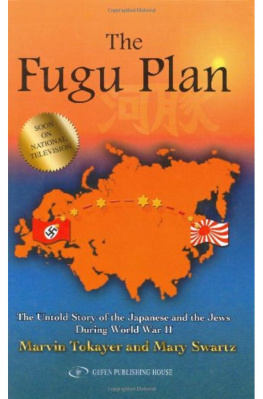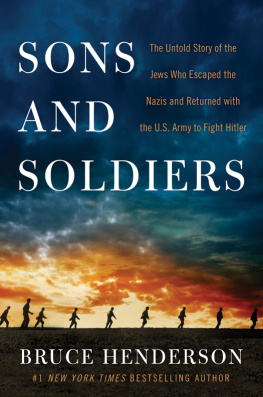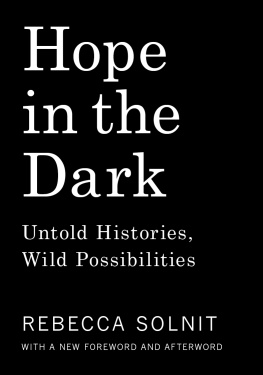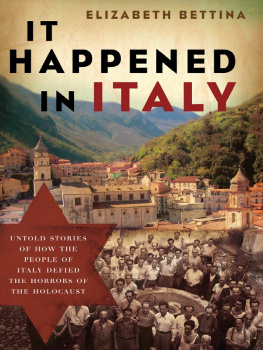Rebecca Erbelding - Rescue Board : the untold story of America’s efforts to save the Jews of Europe
Here you can read online Rebecca Erbelding - Rescue Board : the untold story of America’s efforts to save the Jews of Europe full text of the book (entire story) in english for free. Download pdf and epub, get meaning, cover and reviews about this ebook. year: 2018, publisher: Doubleday, genre: Politics. Description of the work, (preface) as well as reviews are available. Best literature library LitArk.com created for fans of good reading and offers a wide selection of genres:
Romance novel
Science fiction
Adventure
Detective
Science
History
Home and family
Prose
Art
Politics
Computer
Non-fiction
Religion
Business
Children
Humor
Choose a favorite category and find really read worthwhile books. Enjoy immersion in the world of imagination, feel the emotions of the characters or learn something new for yourself, make an fascinating discovery.

- Book:Rescue Board : the untold story of America’s efforts to save the Jews of Europe
- Author:
- Publisher:Doubleday
- Genre:
- Year:2018
- Rating:5 / 5
- Favourites:Add to favourites
- Your mark:
- 100
- 1
- 2
- 3
- 4
- 5
Rescue Board : the untold story of America’s efforts to save the Jews of Europe: summary, description and annotation
We offer to read an annotation, description, summary or preface (depends on what the author of the book "Rescue Board : the untold story of America’s efforts to save the Jews of Europe" wrote himself). If you haven't found the necessary information about the book — write in the comments, we will try to find it.
Rebecca Erbelding: author's other books
Who wrote Rescue Board : the untold story of America’s efforts to save the Jews of Europe? Find out the surname, the name of the author of the book and a list of all author's works by series.
Rescue Board : the untold story of America’s efforts to save the Jews of Europe — read online for free the complete book (whole text) full work
Below is the text of the book, divided by pages. System saving the place of the last page read, allows you to conveniently read the book "Rescue Board : the untold story of America’s efforts to save the Jews of Europe" online for free, without having to search again every time where you left off. Put a bookmark, and you can go to the page where you finished reading at any time.
Font size:
Interval:
Bookmark:
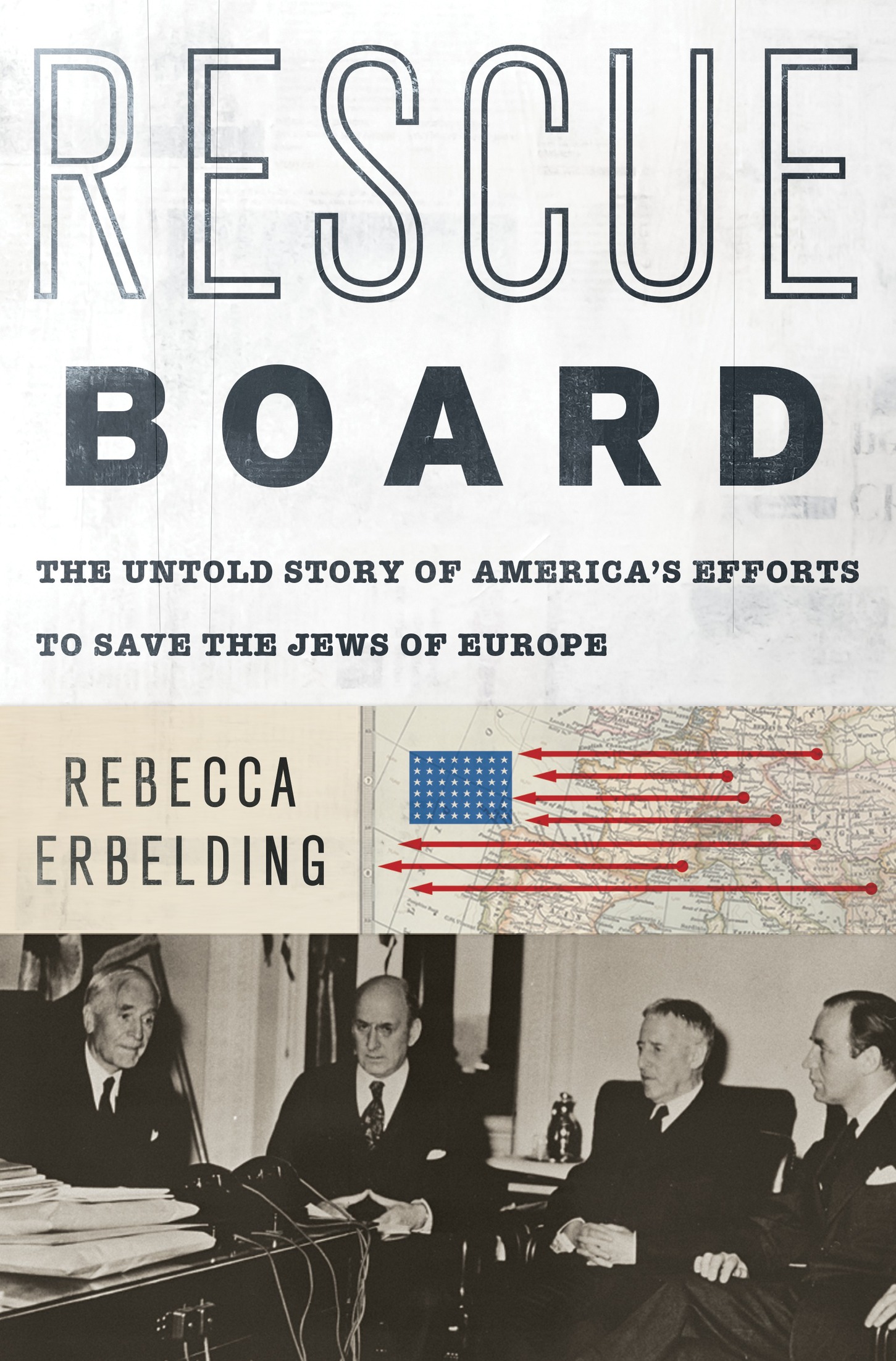
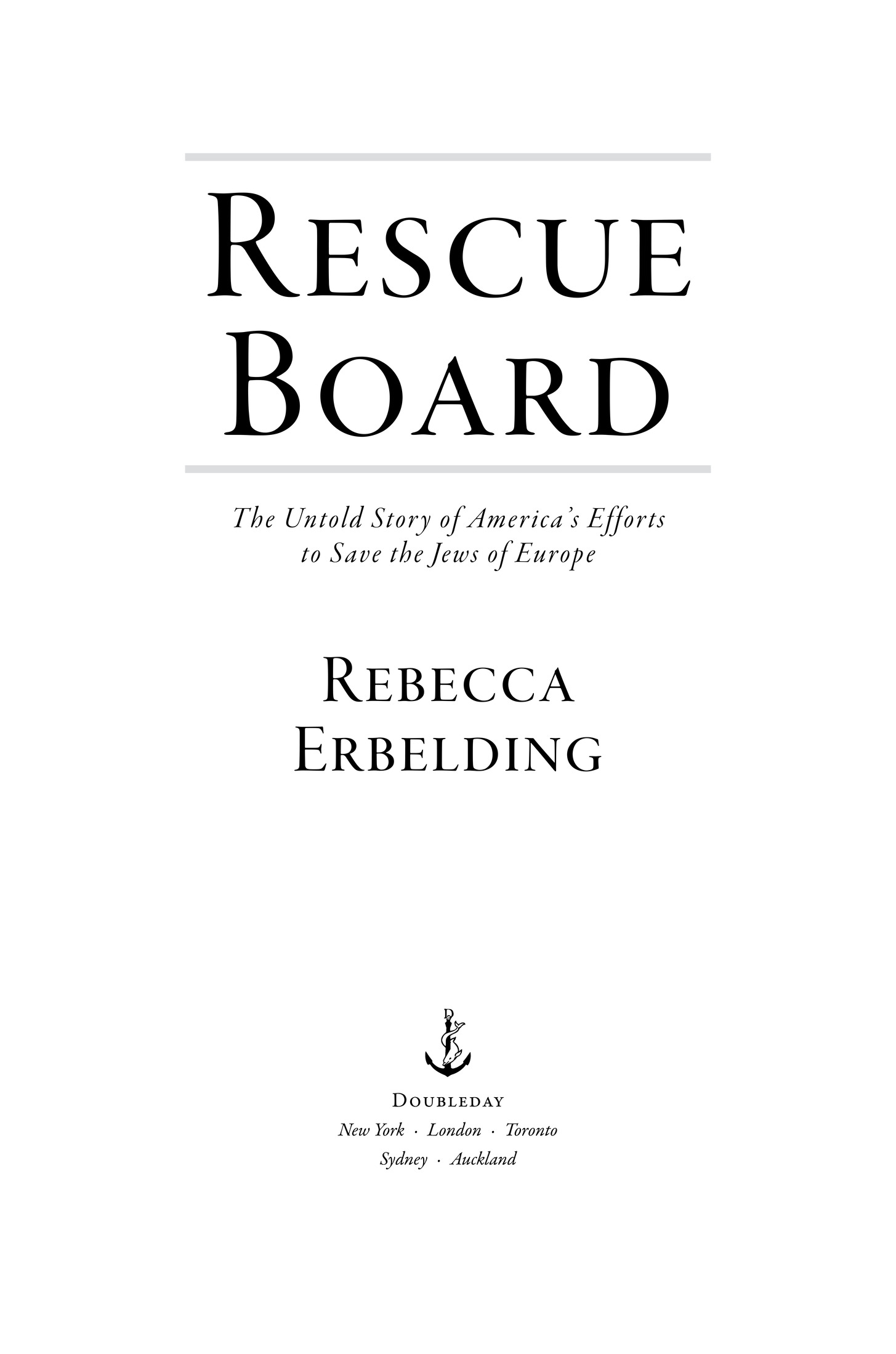
Copyright 2018 by Rebecca Erbelding
All rights reserved. Published in the United States by Doubleday, a division of Penguin Random House LLC, New York, and distributed in Canada by Random House of Canada, a division of Penguin Random House Canada Limited, Toronto.
www.doubleday.com
DOUBLEDAY and the portrayal of an anchor with a dolphin are registered trademarks of Penguin Random House LLC.
Grateful acknowledgment is made to HarperCollins Publishers for permission to reprint an excerpt of The World: Hope from New and Collected Poems: 19312001 by Czeslaw Milosz, copyright 1988, 1991, 1995, 2001 by Czeslaw Milosz Royalties, Inc. Reprinted by permission of HarperCollins Publishers.
constitutes an extension of this copyright page.
Cover design by Michael J. Windsor
Cover images: photo of third meeting of the Board of Directors of the War Refugee Board in the office of Secretary of State Cordell Hull courtesy of Franklin D. Roosevelt Library; map Encyclopaedia Britannica / UIG / Universal Images Group / Getty Images; texture Here / Shutterstock
Library of Congress Cataloging-in-Publication Data
Names: Erbelding, Rebecca, author.
Title: Rescue Board : the untold story of Americas efforts to save the Jews of Europe / Rebecca Erbelding.
Description: First edition. | New York : Doubleday, [2018]
Identifiers: LCCN 2017039969 (print) | LCCN 2017040279 (ebook) | ISBN 9780385542517 (hardcover) | 9780385542524 (ebook)
Subjects: LCSH: World War, 19391945Refugees. | United States. War Refugee Board. | World War, 19391945JewsRescueEurope. | United StatesPolitics and government19331945. | BISAC: HISTORY / Holocaust. | HISTORY / United States / 20th Century. | HISTORY / Europe / Western.
Classification: LCC D809.U5 (ebook) | LCC D809.U5 E73 2015 (print) | DDC 940.53/145c23
LC record available at https://lccn.loc.gov/2017039969
Ebook ISBN9780385542524
v5.2
ep
For Ron
Some people say we should not trust our eyes,
That there is nothing, just a seeming,
These are the ones who have no hope.
They think that the moment we turn away,
The world, behind our backs, ceases to exist,
As if snatched up by the hands of thieves.
C ZESAW M IOSZ , from the poem Hope (1943), published in his 1945 collection Ocalenie (Rescue)
France, August 1942
T HE BUSES THAT TOOK the children away arrived first. The sun beat down, and the loveliness of August in Provencethe olive groves green and gray, the newly harvested wheat fields still goldenstood in stark contrast to the tile factory, a looming brick structure enclosed by barbed wire. Within, more than fifteen hundred people waited for the end to begin.
Nearly seventy children, some just toddlers, were gathered in the factorys dusty courtyard as two large buses pulled up. Their parents did not know where the children would go, only that it would not be to Poland. The Jewish organizations working inside Les Millesthe name of this makeshift concentration camphad negotiated with the French government to exempt the children from deportation. With the hours growing short before the first train was to leave, the time had come to say good-bye. Grasping tiny faces and stroking hair, mothers and fathers gave frantic good-bye kisses and cried, Gut seinBe goodbefore the buses rolled away. Some of the parents screamed and collapsed.
Roswell McClelland watched off to the side, pacing and smoking. A twenty-eight-year-old Californian, Ross was one of only a few dozen Allied aid workers permitted in the concentration camps, mostly representatives of pacifist churches. He and his wife, Marjorie, both worked for the American Friends Service Committee (AFSC), a Quaker organization. Because the AFSC had fed hundreds of thousands of German children after World War I, the Nazis and their French collaborators allowed them entry into the camps to distribute food and clothing while forcing other Americans out of occupied and collaborationist territory. And now, the AFSC found itself in a position none of the staff ever imagined: splitting up families, likely forever, in a heartbreaking attempt to save the lives of the children. As he watched the fathers and mothers wail, Ross tried not to get emotional. Though none of the other aid workers knew, Marjorie was pregnant with their first child. What kind of a world, he wondered, separates parents from their children?
Other prisoners in Les Milles, also watching the scene, had sent their children out of the camp sooner. Relief workersincluding Ross and Marjoriesecreted the kids to orphanages run by the Oeuvre de Secours aux Enfants, a childrens aid organization. As the war dragged on, some of those children would go into hiding with non-Jewish families; others would try to sneak over the border to Switzerland or to Spain; and others would be arrested and deported east like their parents before them. Several hundred children, whose mothers and fathers signed away all parental rights, had already left for America to be placed with new families. A group of fifty children from France had departed nearly three months earlier; their first letters from America would not arrive in time to reach their parents in Les Milles.
It was Monday, August 10, 1942, the beginning of the deportation of foreign Jews from southern France toward Drancy, a transit camp outside Paris. From Drancy, the prisoners would take a longer train ride toward an uncertain fate in Nazi-occupied Poland.
Ross had his suspicions of what awaited the prisoners of Les Milles. He had just returned to Provence after an emergency trip to Vichy, the capital of Nazi-collaborationist France, where he and a group of colleagues had managed to meet with Pierre Laval, the head of the authoritarian government. They implored Laval to cancel the deportations. McClelland impressed upon him that the Germans wanted to exterminate these people. Laval scoffed. The accusation was preposterous, a fiction. The French were assisting the Nazis in removing troublemaking foreign Jews from France, and the prisoners were going to special ethnic reservations in southern Poland where they could live and work together. Besides, Laval added, if the United States loved the Jews so much, why didnt McClellands country accept them?
In fact, many of the prisoners at Les Milles had been collecting the documentation required to get a visa to the United States. But for most, the bureaucratic obstacles erected by both the American and the Vichy governmentsnot to mention the challenge and expense of reserving space on one of the few passenger ships still crossing the Atlanticmade immigration impossible. The AFSCs Refugee Division tried to assist thousands, including a significant percentage of the Les Milles prisoners, with their applications and paperwork. McClelland knew many of themknew their families, knew how close they were to getting the all-important visas, knew them as individuals in a way bureaucracies couldnt.
In the weeks prior to the deportations, Vichy France canceled exit visas for refugees, the last official document a prisoner needed to be released from a camp prior to immigration. As a result, even those who received their U.S. visas could no longer leave. The AFSC protested and got reprieves for a few. But in October 1942, more than 270 letters alerting the recipients their U.S. visas had finally been approved were returned to the Marseille consulate, marked undeliverable. At least seventeen of the letters were for prisoners deported from Les Milles in the early morning of August 11, 1942.
Font size:
Interval:
Bookmark:
Similar books «Rescue Board : the untold story of America’s efforts to save the Jews of Europe»
Look at similar books to Rescue Board : the untold story of America’s efforts to save the Jews of Europe. We have selected literature similar in name and meaning in the hope of providing readers with more options to find new, interesting, not yet read works.
Discussion, reviews of the book Rescue Board : the untold story of America’s efforts to save the Jews of Europe and just readers' own opinions. Leave your comments, write what you think about the work, its meaning or the main characters. Specify what exactly you liked and what you didn't like, and why you think so.

